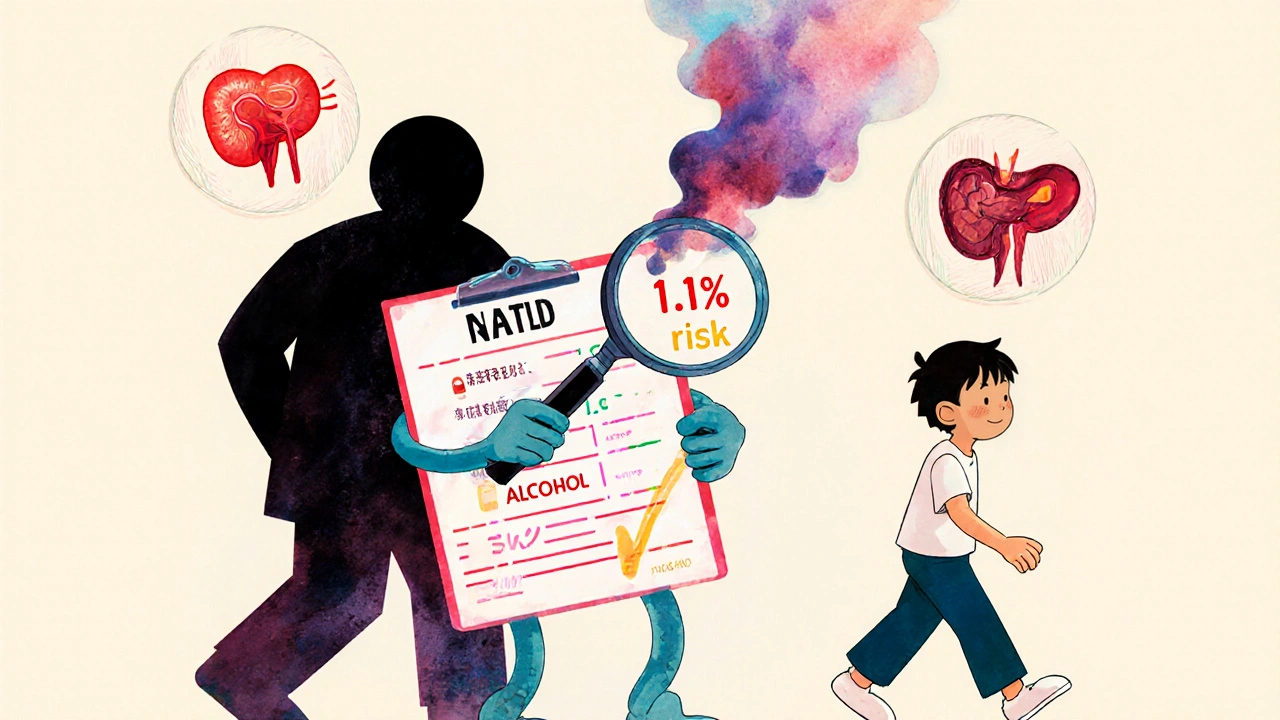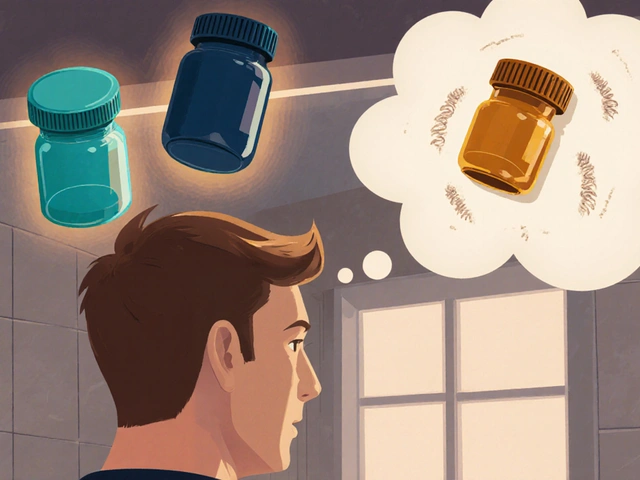Statin Liver Enzyme Risk Checker
Check Your Liver Enzyme Risk
This tool helps you understand if your elevated liver enzymes require action based on the latest medical guidelines.
Important Note: This tool is for educational purposes only. Always consult with your doctor before making any changes to your medication.
When you start taking a statin to lower your cholesterol, the last thing you want to hear is that your liver enzymes are high. It sounds scary. It sounds like your liver is damaged. But here’s the truth: elevated liver enzymes from statins are almost never dangerous. In fact, they’re usually harmless - and stopping your statin because of them could put your heart at greater risk.
What Does It Mean When Liver Enzymes Go Up?
Your liver produces enzymes like ALT (alanine aminotransferase) and AST (aspartate aminotransferase). These help with metabolism. When they show up in your blood at higher-than-normal levels, it doesn’t mean your liver is failing. It just means the cells are releasing a bit more of these enzymes - maybe because of stress, inflammation, or even the statin itself. In most cases, this is a temporary, silent change with no symptoms. You won’t feel tired. You won’t have jaundice. You won’t even know unless your blood test shows it.How Common Is This?
About 0.5% to 2% of people on statins see their ALT or AST rise above three times the upper limit of normal (ULN). That’s the threshold doctors used to worry about. But here’s the key: most of those elevations never progress. In fact, studies tracking over 20 million patient-years found only 32 confirmed cases of statin-induced acute liver failure between 1990 and 2020. That’s 0.00016 cases per 1,000 patient-years. For comparison, you’re more likely to be struck by lightning than to suffer serious liver damage from a statin.Why Did Doctors Used to Check Liver Tests Every 6 Months?
Back in 2001, guidelines said to check liver enzymes every six months after starting a statin. That was based on early caution, not solid evidence. When the FDA reviewed data from millions of users in 2012, they found no proof that routine testing caught serious problems early. In fact, it did the opposite: it scared people into stopping their meds. A study from the Veterans Affairs system showed that nearly 19% of statin discontinuations were due to isolated enzyme elevations - with no signs of actual liver disease. And those patients? They had a higher chance of heart attacks and strokes later on.Which Statins Are Riskier?
Not all statins are the same when it comes to liver impact. Cerivastatin - pulled from the market in 2001 - had the highest risk. Today’s statins are much safer. Pravastatin and rosuvastatin carry the lowest risk of liver enzyme spikes. Simvastatin and atorvastatin are a bit more likely to cause elevations, especially at high doses. But even then, the difference is small. For example, in head-to-head trials, pravastatin caused >3x ULN elevations in only 0.3% of users. Atorvastatin? About 1.1%. That’s still less than 1 in 100 people.
What Makes Some People More Susceptible?
Genetics play a role. If you have a variant in the SLCO1B1 gene - specifically the *521T>C mutation - your body doesn’t clear statins as efficiently. That can lead to higher blood levels and a 3.2 times greater chance of liver enzyme spikes. This is especially true for people on high-dose simvastatin. Age and kidney function matter too. People over 75 with reduced kidney function (creatinine clearance under 30 mL/min) have nearly five times the risk of significant elevations.What Else Could Be Causing High Liver Enzymes?
Before you blame the statin, check for other causes. In fact, studies show that in people with elevated liver enzymes, the real culprit is often something else:- Nonalcoholic fatty liver disease (NAFLD) - present in 45% of cases
- Alcohol use - 19% of cases
- Viral hepatitis (like hepatitis B or C) - 4% of cases
- Obesity or metabolic syndrome
- Other medications (like acetaminophen or certain antibiotics)
That’s why guidelines now say: don’t assume it’s the statin. Rule out the common causes first. In one VA Healthcare study, using a step-by-step algorithm to check for these other reasons cut unnecessary statin stops by over 60%.
Should You Stop Taking Your Statin?
No - not unless your levels are more than three times the upper limit of normal and you’re having symptoms like yellowing skin, dark urine, or severe fatigue. For mild elevations (1-3x ULN), the American College of Cardiology says: keep taking the statin. Retest in 4 to 6 weeks. In most cases, the enzymes return to normal on their own. Even if they don’t, continuing the statin is usually safer than stopping it.Why? Because the cardiovascular benefits are huge. For every 1,000 people on statins for five years, about 25 major heart events are prevented. The number of people who develop serious liver injury? About 1. That’s a 25-to-1 benefit-to-risk ratio. Stopping your statin because of a mild enzyme rise is like turning off your smoke alarm because it went off once - and you didn’t see any fire.
What About People With Fatty Liver Disease?
This is a big one. Many people assume that if you have NAFLD, you shouldn’t take statins. That’s wrong. In fact, studies show people with NAFLD have a lower rate of statin-induced enzyme elevations than those without it - 0.4% versus 0.9%. Statins may even help reduce liver fat over time. The American Gastroenterological Association says clearly: NAFLD is not a reason to avoid statins. In many cases, it’s the perfect time to start them.
What About New Tests and Supplements?
A new genetic test called StatinSafety Plus can check for the SLCO1B1 variant and predict your risk. It’s 84% accurate at spotting who might have enzyme spikes. But it’s expensive. Experts say it’s only worth it for people who need high-dose statins and already have liver issues. Routine use for everyone? Not cost-effective.Some people take Coenzyme Q10 to protect their liver. There’s some evidence it reduces enzyme elevations by 43% in small trials. But we don’t yet know if that translates to fewer heart attacks. It’s not a substitute for statins - just a possible helper. Don’t spend money on it unless your doctor suggests it.
Why Do So Many People Still Stop Their Statins?
It’s mostly fear. A 2021 survey found that nearly 70% of statin users were deeply worried about liver damage - even though only 1.2% ever had enzyme levels above 3x ULN. Online forums like Reddit are full of stories where people panic over a single blood test. One user’s ALT jumped from 28 to 142 after starting atorvastatin. He switched to pravastatin and it went back to normal. He felt better. But here’s what he didn’t know: his original level was still normal. And his new statin was just as effective - with less liver stress.Meanwhile, Mayo Clinic documented 17 patients who quit statins over mild enzyme elevations. Five of them had heart attacks or strokes within 18 months. That’s the real danger.
What Should You Do?
Here’s a simple, step-by-step plan:- Get a baseline liver test before starting a statin.
- If it’s normal, don’t get routine tests again - unless you develop symptoms.
- If your enzymes rise but stay below 3x ULN, keep taking your statin and retest in 4-6 weeks.
- If they go above 3x ULN, pause the statin for 4 weeks, then retest. If levels drop, restart at a lower dose or switch statins.
- If you have symptoms (jaundice, nausea, dark urine), stop the statin and call your doctor immediately.
- Always rule out alcohol, hepatitis, obesity, and other meds before blaming the statin.
The Bottom Line
Statin-related liver enzyme elevations are common. Serious liver injury is not. The risk of heart attack from skipping your statin is far greater than the risk of liver damage from taking it. If your doctor tells you your enzymes are high, ask: Is this above 3x ULN? Do I have symptoms? Have we ruled out other causes? If the answer is no, then keep taking your statin. Your heart will thank you.Are elevated liver enzymes from statins dangerous?
In almost all cases, no. Elevations in ALT or AST below three times the upper limit of normal are common and usually harmless. They rarely mean liver damage. Serious injury from statins is extremely rare - fewer than 1 in 10,000 users.
Should I stop taking my statin if my liver enzymes are high?
Only if your levels are above three times the upper limit of normal and you have symptoms like jaundice, nausea, or fatigue. For mild elevations, guidelines say to keep taking the statin and retest in 4-6 weeks. Stopping unnecessarily increases your risk of heart attack or stroke.
Which statin is safest for the liver?
Pravastatin and rosuvastatin have the lowest risk of liver enzyme elevations. Atorvastatin and simvastatin carry slightly higher risk, especially at high doses. But the difference is small - all approved statins are considered safe for the liver when used appropriately.
Can I take statins if I have fatty liver disease?
Yes - and you should. People with nonalcoholic fatty liver disease (NAFLD) actually have a lower rate of statin-induced enzyme spikes than those without it. Statins may even help reduce liver fat. Major liver and heart associations agree: NAFLD is not a reason to avoid statins.
Do I need regular liver tests while on statins?
No. The FDA and major medical groups no longer recommend routine liver testing for people on statins. A baseline test before starting is enough. Only retest if you develop symptoms or if your initial test was abnormal. Routine testing causes unnecessary anxiety and leads to avoidable statin stops.









I used to panic every time my ALT jumped. Then I learned it’s usually just noise. My doctor kept me on atorvastatin after mine hit 130 - no symptoms, no jaundice. Two months later? Back to normal. I’m still here, heart healthy, and not scared of blood tests anymore.
Stop the statin? Only if you’re turning yellow or can’t breathe. Otherwise, you’re trading a tiny, invisible risk for a very real one.
Finally, someone says this out loud. So many patients I’ve seen quit statins over mild enzyme elevations - and end up in the ER with chest pain six months later. The liver isn’t failing. The heart is the one in danger.
Guidelines changed because the data was overwhelming. It’s time the public caught up.
bro. i took simvastatin for 3 years. my liver enzymes went to 280. i thought i was gonna die. i stopped. felt better. then had a mini stroke at 52. now i’m on pravastatin. enzymes are 45. i’m alive. the fear is worse than the statin.
stop listening to reddit horror stories. talk to your doc. not your cousin’s friend’s cousin.
in india, we see this all the time - people stop statins because their liver test looks scary. but most of them are overweight, drink occasionally, and eat fried stuff daily. the statin? probably the only thing keeping them alive.
my uncle had NAFLD. doc told him to take rosuvastatin. he refused. now he’s on dialysis. statins didn’t kill his liver - his lifestyle did.
Important note: The 0.5–2% rate of ALT/AST >3x ULN is misleading without context. In healthy adults, the upper limit of normal for ALT is often set too low - especially for men and those with higher BMI. Many 'elevations' are just statistical noise.
Also, CoQ10? It may reduce enzyme levels slightly in small studies, but there’s zero evidence it reduces cardiovascular events. Don’t confuse biomarker changes with clinical outcomes.
And yes - NAFLD patients have lower rates of statin-induced elevation. Their livers are already stressed, so they adapt. Fascinating, really.
So what you're saying is I should ignore my body and keep taking poison because some doctor says so?
I don't care about your stats. My liver felt weird. My skin itched. I stopped. I feel better. You want me to risk my health for a 'statistical benefit'? That's not medicine. That's cult mentality.
The epistemological tension here lies in the conflation of statistical population-level risk with individual phenomenological experience. The data is robust - yet the subjective reality of bodily unease remains unaddressed by clinical guidelines.
One may rationally accept the 25:1 benefit-risk ratio, yet still feel the visceral dread of biochemical deviation. This is not irrationality - it is the human condition confronting algorithmic medicine.
Statin-related liver enzyme elevations are common and usually harmless. Serious injury is extremely rare. Keep taking your medication unless you have symptoms or levels exceed three times the upper limit of normal.
Let’s be real - the real villain here isn’t statins. It’s the medical system that scared people into thinking every lab value is a death sentence. I’ve seen patients cry because their ALT was 78. That’s not liver failure. That’s a number on a screen. Your liver doesn’t care about the reference range - it cares if you’re alive.
And the irony? The same people who panic over a 142 ALT will happily take ibuprofen for a headache every day. That stuff can wreck your liver too - but nobody warns them.
Meanwhile, statins have been shown to reduce liver fat in NAFLD patients. The drug they’re afraid of? Might be the only thing healing their liver.
It’s not about being brave. It’s about being informed. And if your doctor’s not explaining this to you clearly? Find a new one. Your heart doesn’t have time for fear-based medicine.
in my village, we used to say: 'if your blood test scares you, your heart is already scared.'
statins are like rain - they don't make the soil wetter, they make the roots stronger. the liver enzymes? just the soil whispering. listen to the whole garden, not just one leaf.
my friend took atorvastatin, saw his ALT jump, panicked, quit. six months later, he had a bypass. now he’s on pravastatin. enzymes? fine. heart? beating.
don’t let fear write your prescription. let science hold your hand.